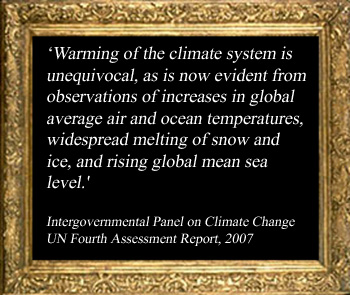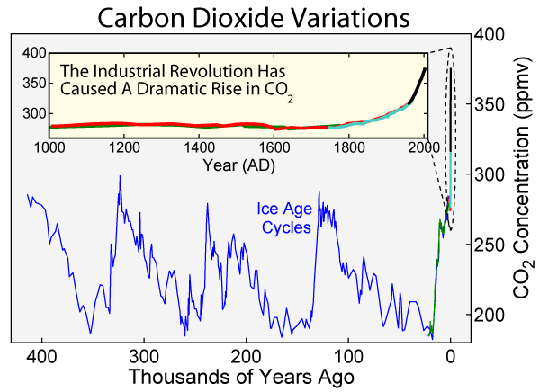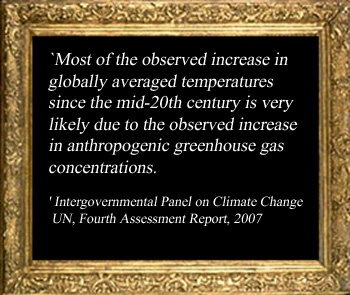“OK Albert, give it to me straight about climate change. Is the world getting warmer?”
I think the answer to that question is a definite yes. “So why are some people saying global warming is a liberal conspiracy by the makers of wind generators and the like?”
“So why are some people saying global warming is a liberal conspiracy by the makers of wind generators and the like?”
You are confusing something that a lot of other people are confusing too. There are two questions about climate change not just one. The first is the one you have just asked, ‘Is the world getting warmer?’ The second question is what is causing that change. It will be impossible to be absolutely sure about the cause of any temperature change until it is too late. Trying to prove that one thing causes another is surprisingly difficult when it comes to anything as big as the planet. People who seem to be arguing against climate change are usually arguing against the cause of climate change.
“So the world is definitely getting warmer?”
Here is a graph of the world temperature over the last 150 years. The last ten years have been the warmest for a very long time, almost 1oC warmer than back in 1860.
“Only a degree? That’s not much. The temperature can change that much from one day to the next.”
True but that is just the average so in some places it may be hotter and other places cooler. What is also certain is that glaciers and ice at the North Pole are disappearing.
“Does that really matter?”
What happens to the ice that melts?
“It goes into the sea.”
So the sea level rises and low lying cities will be flooded. The sea level has been rising for the last hundred years as the temperature has risen. Ice is also shiny and so ice helps to reflect a lot of the sun’s heat back into space. The worry is that once the ice starts to go, the world will heat up faster and faster as more of the sun’s heat is absorbed rather than reflected.
“So what is all this talk about carbon foot prints and CO2?”
Since humans invented factories and engines we have been pumping huge quantities of CO2 into the atmosphere by burning fossil fuels like coal, oil and gas.
“Why are coal, oil and gas called fossil fuels?”
Oil, coal and gas are all made from fossilized sunlight.
“Huh?”
Millions of years ago carbon dioxide, water and light were converted into sugar and various other molecules, by photosynthesis in plants. When the plants died some of them ended up being buried and over millions of years these prehistoric compost heaps were buried deeper and deeper. Cooked by the heat of the rocks deep in the Earth and squeezed by millions of tons of rock above, the compost was converted in oil or coal and sometimes gas as well. This is why oil and coal are called fossil fuels; they are a type of fossilized compost. When they are burnt to release energy, the carbon dioxide and water that was trapped by photosynthesis millions of years ago is released again. And as we know, carbon dioxide is a greenhouse gas. So even though you could say that most power stations and cars are already solar powered because it took sunshine to make the fossil fuels in the first place, this isn’t any help to the planet. At the moment CO2 makes up only a tiny proportion of the Earth's atmosphere, around three ten thousandth's of it. But all this extra CO2 from cars and factories could double the amount of CO2 in the atmosphere in the next few decades. 
“Won’t some of the plants and trees today end up buried and eventually turn into oil?”
I suppose they will.
“So what is the problem? We burn some fossil fuels now but if more are being made there shouldn’t be any problem should there?”
Good thinking but the fossil fuels being burnt at the moment have taken millions of years to form and will be used up in a few hundred years. So CO2 is being released far faster than it can be turned back into oil and coal. The question is can the Earth cope with millions of years of CO2 being released all in one go?
“Can it?”
Well the only way to be sure is to burn it all and see what happens. We’ve been doing that and the world has been getting warmer and warmer. So if we are worried about CO2 we need to stop burning fossil fuels and find other ways of powering our cars and factories. If we made fuel directly from plants, biofuel, the CO2 released as we drive around would be the same CO2 which was captured from the atmosphere a few months earlier. That way the amount of CO2 wouldn’t increase.
“That’s a good idea isn’t it?”
It is as long as it doesn’t take too much energy to make fuel from plants like corn in the first place. The other problem is that rich countries with enough food might buy up so much corn that poor countries will find it even harder to feed all their people.
“Oh, I’d never thought of that.”
It’s not even a new idea. When the diesel engine was first invented it was designed to use peanut oil and when cars were being made popular for the first time by Henry Ford back in 1903 he designed his Model T Ford to use alcohol as a biofuel.
“Wow, so he knew about climate change back then?”
Not at all, he was no environmental angel. He thought it would be cheaper.
“So why didn’t he build the Model-T Ford to run on alcohol?
Oh, the usual reasons, politics. In 1919 alcohol was banned in North America during the prohibition era and powerful oil interests pushed for gasoline to be used on its own, but imagine how different the world would be if cars had been burning ethanol for 90 years not fossil fuels. The Middle East would be a very different place and world politics would be completely different. Better? Who knows, but certainly they’d be less CO2 in the atmosphere.
“So are humans and all this extra CO2 really responsible for this increase in temperature? Last time we spoke you said that the climate on Earth has had all sort of crises over the last few hundred million years. Ice ages, mini-ice ages and all sorts. If cars were only invented a hundred years ago and the climate has been doing wild things for millions of years it’s not necessarily the fault of humans releasing too much CO2.”
No, but it could be. If there’s any more than a reasonable chance that humans are damaging the planet then they should probably do something about it before it’s too late, don’t you think?  “I was hoping that scientists could give me a more definitive answer. It seems like a simple question to me.”
“I was hoping that scientists could give me a more definitive answer. It seems like a simple question to me.”
Well, it’s a question you would have to ask just a single scientist who only has one hand if you want a definite answer.
“Why?”
Because, if you find two scientists they will always disagree about some detail because that is their job. After all, if you accept everything you read you without questioning it you are not a proper scientist.
“OK, but why only a one handed scientist? What’s that got to do with it?”
If a scientist has two hands then he or she can always say, ‘well, on the one hand CO2 is the most likely cause, but on the other hand we can’t completely disprove other theories.’
“Not bad Albert, not exactly funny but not bad for you. Jokes aside why can't scientists just work out what will happen to the world’s climate with a computer so we can stop talking about it and do something about it?"
Nice idea but that assumes that scientists can predict the weather and politicians around the planet can agree what to do about it. Humans seem very bad at both these things. Weathermen have some of the fastest and most expensive computers in the world to help tell them what the weather will be like tomorrow. Initially the calculations took so long that by the time they had got the answer for tomorrow's weather, the weather had already happened. By the time computers got fast enough, the predictions were still not perfect. Then came along a bunch of mathematicians would told them they were wasting their time even trying. This was the birth of Chaos Theory and for a time weathermen, or meteorologists as they call themselves which is a bit odd as they don’t study meteors, were a bit depressed as predicting the weather accurately seemed impossible.
“What is Chaos Theory?”
Chaos theory says that even in systems that seem to have well defined mathematical rules for what should happen next, minute variations can, over time, lead to completely different results. Take a pendulum swinging back and forward, what could be more predictable? But add a little pendulum on the end of the pendulum and it starts to swing very strangely. Add just one more little pendulum on the end and it will swing so chaotically that it is impossible to predict the pattern. Now the climate of the whole Earth is a lot more complicated than a triple pendulum, but it can behave just as unpredictably. We can’t predict whether it’s going to be a good or bad summer next year because of this unpredictability, so predicting the effects of climate change or reducing our production of CO2 is at best and educated guess.
“So Albert, what do you, as a no-handed computer recreation of a famous scientist, say about climate change?”
Imagine you are sitting in your house as a forest fire gets nearer and nearer. What are you going to do?
“What’s that got to do with it?”
Trust me, it will make sense.
“OK. When I got really worried about the flames getting too close I’d eventually leave to go somewhere safer.”
Now imagine the Earth is that house. There is nowhere else for us to go. All we have is this one little planet. Anyway would you really just sit in your house and do nothing until you could see the flames?
“Of course not, I’d phone the fire brigade.”
Would you expect the fire brigade to do anything as the flames continued to spread?
“Of course, I would.”
Imagine they said, ‘We didn’t cause the fire. It was caused by the sun being too hot and drying out the forest too much, so we don’t have to do anything about it.’ What would think then?
“I’d be furious, they should try and do what they could. They could drop water on the flames from helicopters, that would help whatever caused the fires in the first place.”
Exactly. So even if most scientists are wrong and humans aren’t the most important cause of global warming, it doesn’t make sense to do nothing. We know CO2 can act as a greenhouse gas, so reducing human release of CO2 might be the only sensible thing we can do to try and stop the Earth getting hotter and hotter. If there is something you can do which could help isn’t it worth a try? If that something would also avoid polluting the planet, what do we have to loose? At worst, if we are wrong about humans causing global warming and wrong that reducing our CO2 will help, we’ll have a warmer planet that is less polluted.
“Seems simple when you say it like that?”
Everything should be made as simple as possible, but no simpler.
This is the story of a great journey that started with a great thought. One day in 1895 a boy looked into a mirror and wondered what the universe would look like if he could travel on a beam of light. That sixteen year old boy was Albert Einstein and that one thought started him on the road to discover his Theory of Relativity. The great man has been reinvented as Albert 2.0 to come back and blog about a journey through space on a beam of light and explain the science behind everything from atoms, blackholes to global warming. If you've just joined and want to start at the beginning use the index on the left. If you're bored try these links below just for fun.
UNSCRAMBLE EINSTEIN'S BRAIN
PRACTISE SAVING THE WORLD FROM ASTEROIDS
ALIEN CONTACT CALCULATOR
HEAR THE REAL EINSTEIN TALK ABOUT E=Mc2.
Saturday, October 27, 2007
Climate Change Made Simple
Labels: biofuel, carbon dioxide, Climate change, Henry Ford
33 Comments:
Subscribe to:
Post Comments (Atom)








Einstein would never make that mistake.
Thermodynamically incorrect on many fundamental levels. Again, not something Einstein would say ... it's not even average global temperature. The graph shows a statistical sampling of temperature anomalies, arithmetically averaged. It's trend has a widely accepted value in this discussion, but equate to earth's temperature is unscientific at the very least.
Great site -- love the perspective.
the comments from the last anonymous are not correct regarding hockey stick and IPCC report. Also the temperature were not revised significantly downward in the sense that you would notice a difference on the graph you have produced.
Also although you talk about the problems in predicting weather surely you should be talking about climate, which is a different thing entirely. I'm not saying that predicting climate is easy, but it is confusing to talk about chaotic systems - although the weather is chaotic the climate acts in a more organised fashion.
As to whether he would have bought into the precautionary principle and advocated massive "climate policies" is anybody's guess.
Great site! I think Albert would agree that pointing out the inaccuracy is important and yet come to the conclusion that it is stupid NOT to act. Wrong and false both about the existence of global warning and/or whether it is caused by humans is irrelevant to the fact that the humans on this planet will benefit from keeping it clean and be smart about how we use the planets resources.
I cannot believe why this is such a big issue. It's only common sense - you do not need to be Einstein to understand it!
Congratulations, I think your approach is unique and I love it.
I think the graph on growing temperatures is biased, and I wouldn't expect you doing that, that is stressing relativity a little bit too much. Because as your theory proposes, everything depends on the reference. It seems you carefully chose as initial point the cooles time in the last 1000 years, the period so-called Little Ice Age.
Then the mistake on melting North Pole, I think it is well-known melting of floating ice does not affect sea-level. Only ice melting in Greenland or Antarctic would cause that, supposing noting else changes. Because as temperature rises, atmosphere is able to keep more evaporated water in it, not everything goes to the sea. Furthermore, the IPCC will soon publish a report explaining Antarctic ice sheet is actually growing, and will grow even thicker, because of increased snowing, associated to increased evaporation, due to increased temperature.
Finally, you talk abut two questions on global warming: is it happening, is it caused by human action. But you miss another one, is global warming good or bad for human life?
This is a sign of climate warming not cooling.
A sign of climate cooling would be increased snowfall where it used to rain.
Quickly though, IPCC definitely seems to be a creation of the UN. IPCC seems to have its own agenda, wanting funding and the UN is more then happy to use this alarm to hide their shady dealings. Seemingly the cry against global warming, as ‘Einstein’ said in this piece, always comes from those with an agenda against the causers. Also, the research done is usually by political scientists and not often the private sector. Also, let it be reminded that though this is a more stable producer of CO2, human life is still a major one. Humans are lil' CO2 emitters that produce an alarming that would make a gas baron blush. I believe the soaring population caused by the industrial revolution might be a larger impact.
^_^ On the other hand, (Yes, I have two hands.)I didn't know about the use of alcohol as the original fuel source and simply walking onto an university and asking around shows you the split between Professors and students alike. I think you did well to present this, while articulating that Einstein would probably lean more towards leaving the environment alone. (But who really knows these things?)
-Insane 3rd Year Physicist, lover of this site.
PS: I hate IPCC.
Yes glaciers have been melting but not any faster than the previous centuries. The ocean rise during the last century was a whole 3.5 inches. Like, that will really flood the sewers of New York. I read of that the positive forcing of increasing CO2 is a declining logarithmic function that will not lead to a tipping point. The only tipping is gullible people sanity when they buy into all this hysteria.
The leading IPCC GCM guru said that the climate models where just tools-NOT PREDICTORS. So that IPCC claim that the recent temperature increases are due to emissions is based on their very questionable GCMs.
Yep, they use to burn alcohol back then but gasoline was a better fuel, less corrosive, less flammable, more energy. A better biofuel would be butanol.
The biggest impact humans are having on the environment is the resources they consume and the land it takes to provide those resources. Controlling CO2 emissions would do very little to prevent temperature increases but it will sure impact the economy, AKA pocketbook. It's a bunch of Envirocrats and grant chasing opportunists that are creating this global warming fear mongering over CO2 emissions.
Go to these sites for a reality check:
www.co2science.org/articles/V10/N10/EDIT.php
adognamedkyoto.blogspot.com
Ocean temperatures are a better metric for the Earth's average heat content because of greater heat capacity of water over air. Sea temperatures are falling, according to the 3000 odd array of remote sensing buoys that record down to level where the temp. is a constant 4 Centigrade.
The Aquila satellite shows that the periodic currents in the Oceans are all turning to a negative, cooling phase.
The Solar component of warming was measured by the incomplete so called 'Total Solar Insolation' measurement, u.v., electrical and radio inputs that are much higher in periods of increased sunspot cycles. The present cycle 23 is now 13 years, the last time it was this long a very cool period was about to happen, (Napoleon, Moscow) Cycle 24 has been down graded to moderate or low, and 25 is almost universally agreed to be a low activity one.
Without the warmth and added CO2 over the last few decades, which have added up to 20% to the Earth's food supply we would be in trouble, cutting CO2, which contributes with water and hydrogen from water approx. 97% of all biomass we will be cutting our throats in the coming cooling 30 yrs. in my humble opinion!
I don't think the oceans will rise 60 feet and sink all the coastal cities, but it is folly to think that we can pee in the pool forever...
Most of the worlds lungs are in the southern hemisphere, and we have been decimating it for a long time. When you add that to the excessive CO2 contributions, it does make a scary scenario!
Whether one believes in global warming or not, it is rude to even suggest that fossil fuels are good, or that using food for gas is better. Find an alternative; on this blog it is noted that hydrogen is the most prevalent element in the universe!! Why are we not following up on this?? We need to step up and start using what nature has provided, instead of forcing our will on everything...
Ignorance begats incoherance
that a smug know-it all climate change commentator can't spell incoherence. It seems that climate change denial types aren't ominiscient after all. There's a surprise!
There is only one provable consequence of higher CO2 concentrations in the atmosphere and that is not warming but an increase in plant growth.
It is not right to say that even if CO2 emmissions do not contribute to climate change we should reduce them. If we base any decisions on wrong conclusions we are bound to make matters worse.
brad (not afraid to leave name, just dont have any accounts)
Therefor an increase of just a degree or two can significantly increase crop yield. Indeed, the Medieval Warm Period saw growth in urbanization as farmers moved beyond sustenance farming.
Ref:Encyclopedia of world climatology
By John E. Oliver
http://books.google.ca/books?id=-mwbAsxpRr0C&pg=PA316ei=Zyb6ScG5NY7SNLvvtLUE&sa=X&oi=book_result&ct=result&resnum=6#PPA316,M1
You seem to be intelligent? I only have two questions that no one seems to want to answer. If CO2 is driving global temperature change, then what is driving atmospheric CO2? That is, what caused atmospheric CO2 to go up and down over the past 400,000 years? Is it possible that it's the other way around - that CO2 levels in the atmosphere are caused by the temperature of the oceans, which in turn is controlled by the big, yellow thing in the sky? Wow! Wouldn't that be a bummer>
A case of unidimensional thinking? There are many parameters and interactions in complex systems. The question is simply which ones can we control? Certainly not the sun. Our own activities? Yes. The point I make in conclusion is quite accepting that current models may be wrong but one beneficial consequence of current beliefs will be a move to less polluting forms of energy generation. Surely a good thing?
Perhaps a good thing? Yes, to a point. It is true that the scientific situation is dynamic. It is also true that the vast majority of the causes are subtle. However, to invest a large part of the worlds scientific treasure on one of the most insignificant players in the green house effect equation is in my humble opinion wasting intellectual and physical capital on a clever ruse. Global warming exists. Global cooling exists. Both are emergent properties from a miriad of players in the physical world. I am afraid that man is one of the insignificant ones. We like to think of ourselves as having the ability to change climate. Or, at least 'influence' it for the good of the planet and of course ourselves. We don't seem to understand that we are part of nature not natures master. The inertia of climate change in either direction is enormous and the time scale is on the order of hundreds if not thousands of years. If there is anything to fear from global warming it is not our contribution to it, it is our overreaction from it.
A very Unique explaination.I loved it...laughed a little at times...no ..no prof...dont get me wrong ....all you've written is not a joke to me [i am serious about it and have made 2 posts on Gather,If you do have time do see it ,its a little amatureous...but I am trying my bit too. ]but its the funny way you have put it across.
Yes,I agree what ever the reasons for CC. we humans must what we can to mitigate it.
Congrats.... a well written